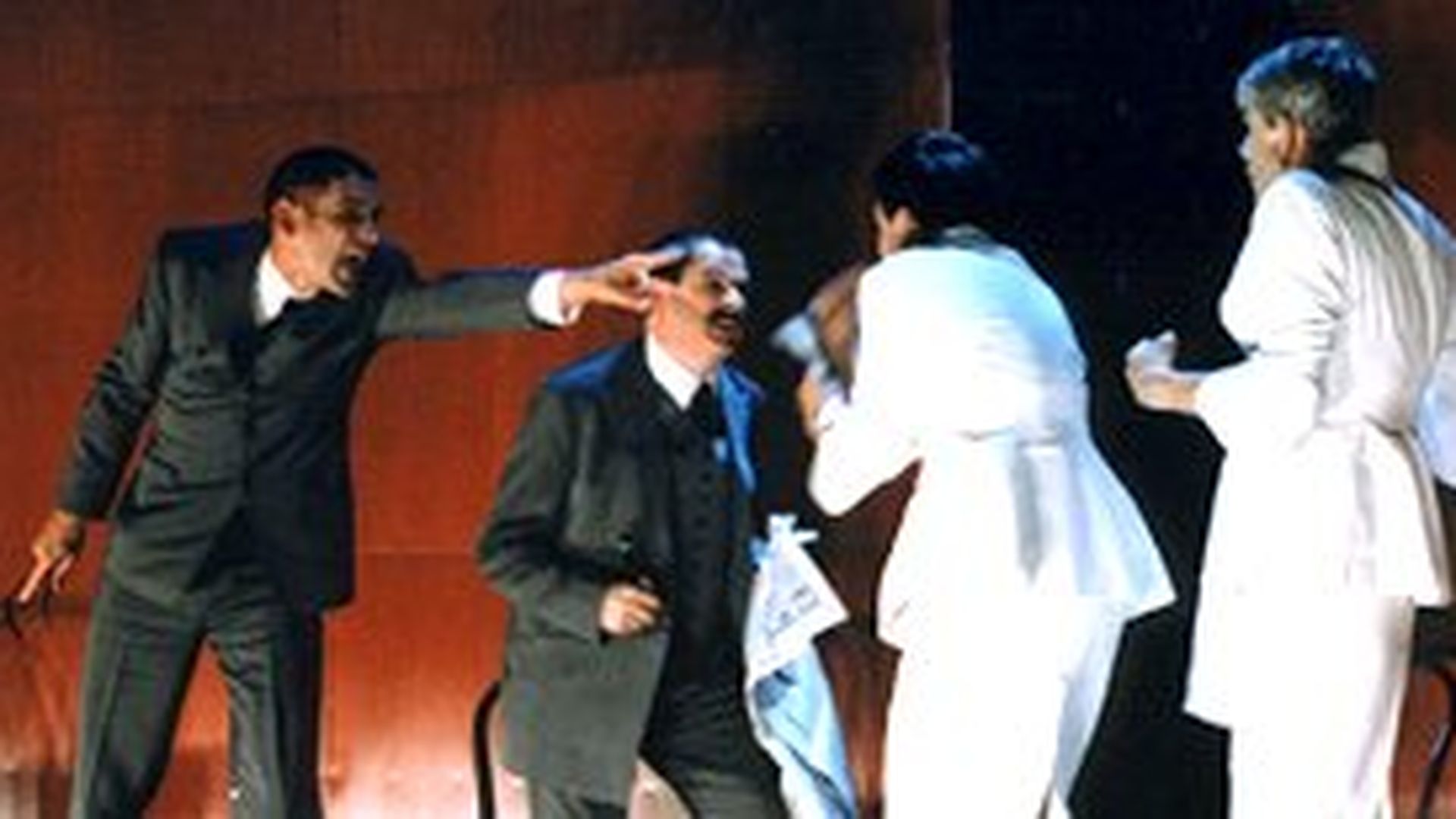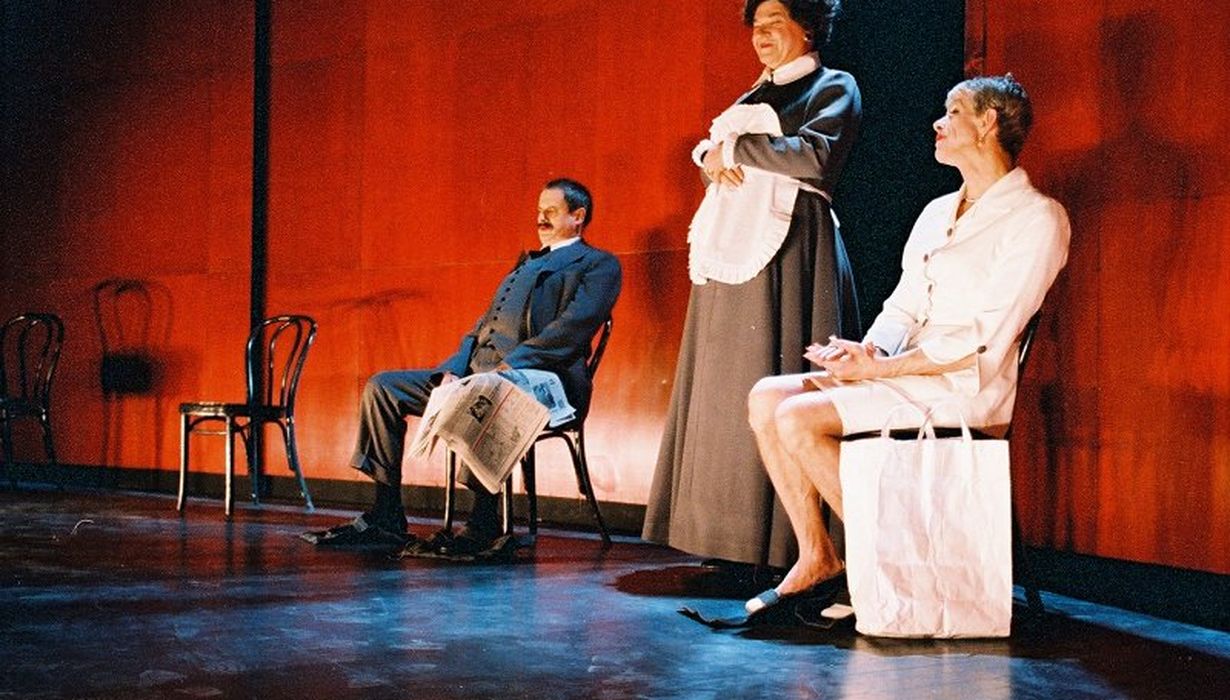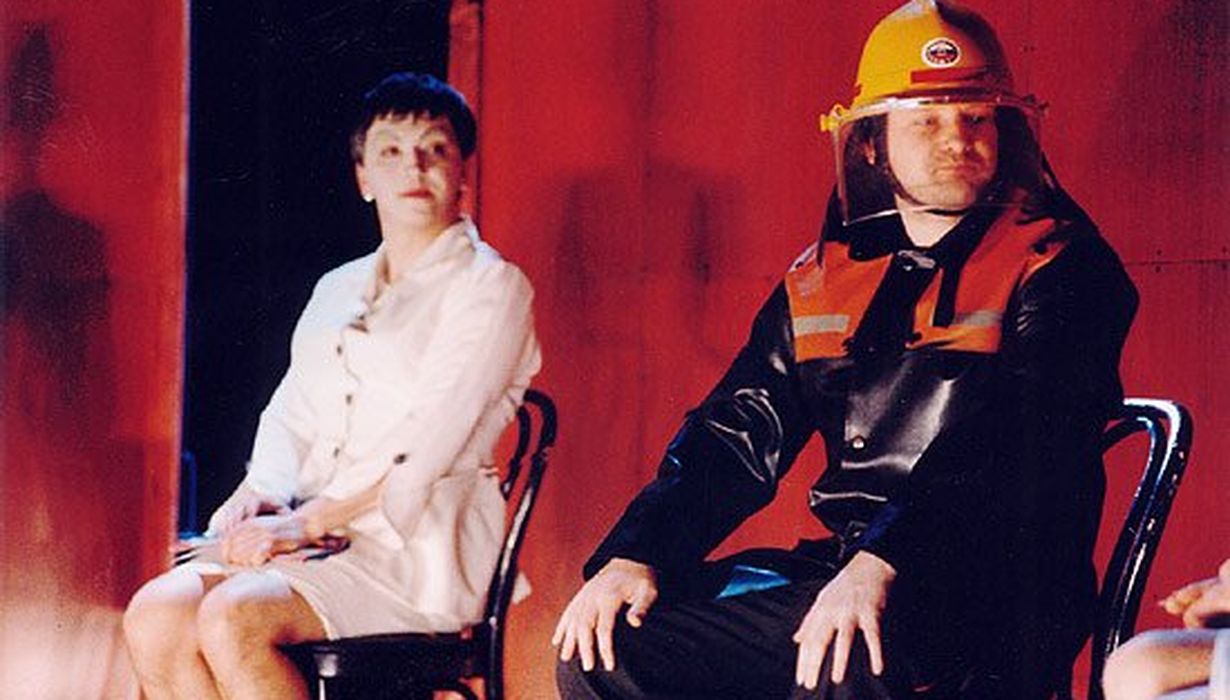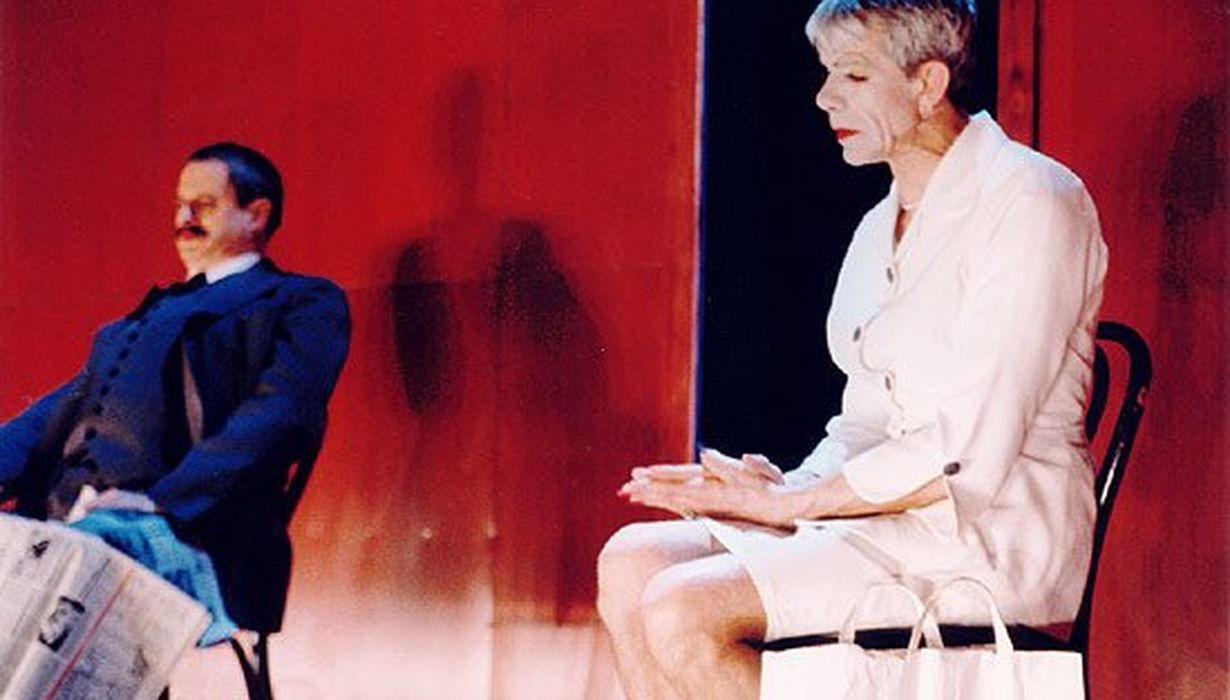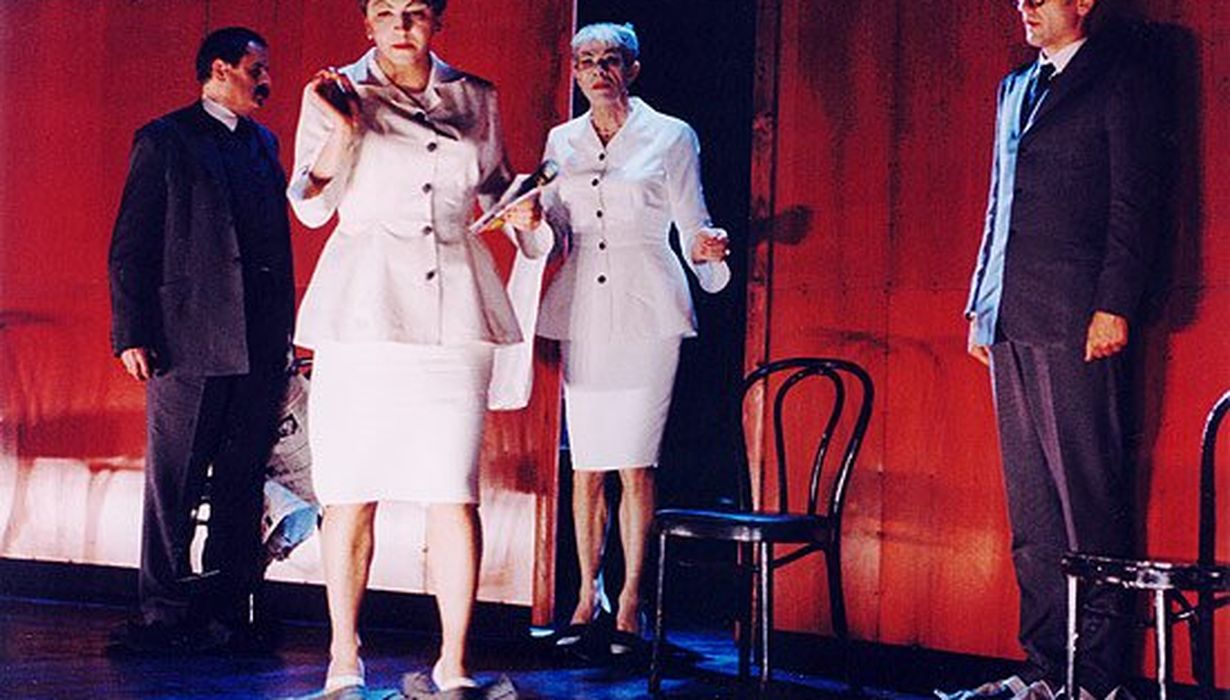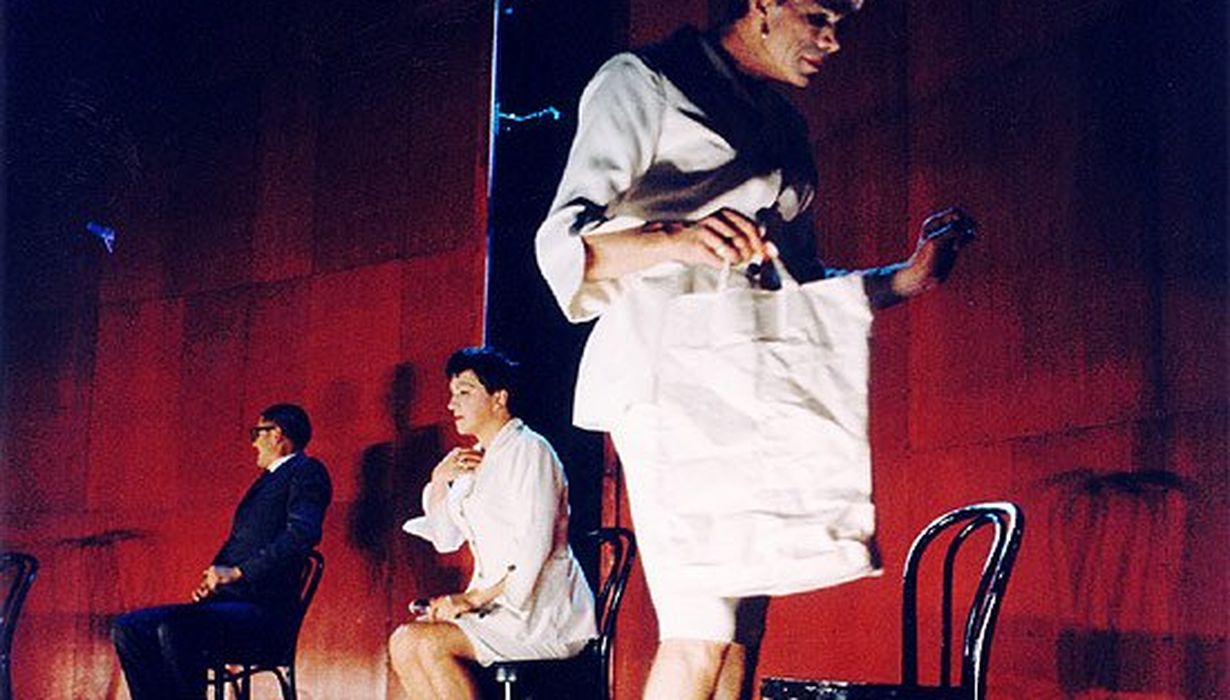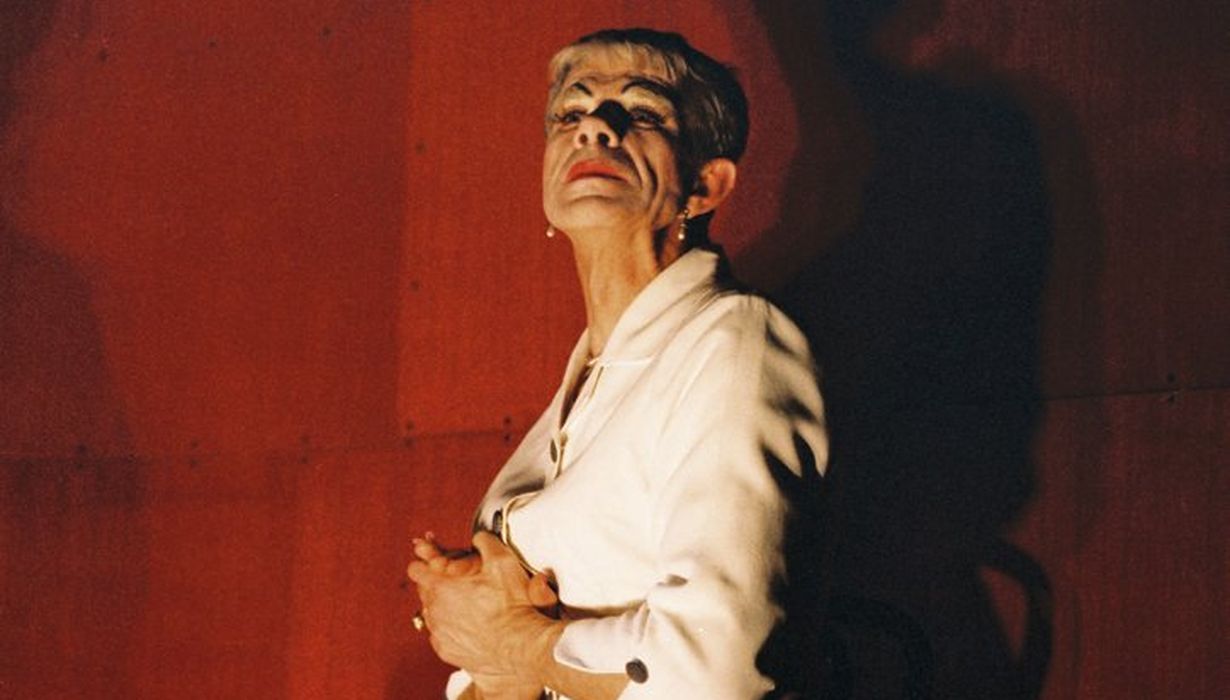PREMIERE
20. april 1995
/.../ The Bald soprano is the vision of the certain universal middle class by which the "bourgeois" represents the personification of all the banality, of the slogan, of the conformism wherever or whenever it can appear; and the inherent conformism of the petit bourgeois is of course betrayed by the automatism of his language. The text of The Bald soprano or better of my textbook of English (or of Russian or Portugal, if you wish) conversation, made such as it is, of the already made expressions and of the most obvious banalities as one can imagine, has that way revealed a secret of "talking and telling nothing", the secret of talking and telling nothing because there is nothing personally to be told, of the absence of the inner life, the mechanical soulessness of the everyday routine: the man who is completely emerged in his social context and inseparable from it. The Smiths and the Martins do not know anymore how to talk as they do not know anymore how to think; and they do not know anymore how to think because they do not know anymore what the feelings are since they have no passion left in themselves. They do not know anymore how to be and thus they can "become" anyone, anything; since they are not in themselves they are nothing more that other people, they belong to the impersonal world, they are replaceable.
Eugene Ionesco, Notes et contre-notes, 1962
Creators
-
Translator
Srečko Fišer -
Director
Vito Taufer -
Dramaturg
Marinka Poštrak -
Language Consultant
Srečko Fišer -
Set Designer
Aljoša Kolenc -
Costume and Make-up Designer
Alan Hranitelj -
Light Designer
Samo Oblokar
Performing
Mr. Smith
Janez StarinaMrs. Smith
Ivo BarišičMr. Martin
Radoš BolčinaMrs. Martin
Iztok MlakarMary, Servant
Stane Leban k. g.Captain of the Fireman
Peter Musevski
In the Media
Radoš Bolčina, Janez Starina, Stane Leban, Ivo Barišič, Iztok Mlakar and Peter Musevski had once again convinced us that they are not only brilliant actors but that they simply live on the stage. With their interpretation of the characters they have succeeded in what every single actor dreams about: that the spectator can identify with the characters on the stage.
Tomo Vidic, The essence is revealed in the perverted, Primorske novice, 1995, Slovenia
It does not happen very often that, when the performance is over, the audience not only applauds but ovates. This is exactly what the six actors of the Slovene theatre achieved at the international Festival for the opening of the restored theater Mestno gledališče. They succeeded although as a classical play of the absurd - the so called anti-drama –The Bald Soprano doesn't have continuity of significance; it is a textual collage, which Ionesco wrote inspired by the English conversational manual.
The director cast men to play the roles of women, which only escalated absurdity until it culminated in a grotesque. He led them so that with their gestures, way of walking, mimic, arm movements and studied changes of voice (…) they melted the level of significance and the level of their acting into one.
The result is a brilliant performance of Janez Starina, Ivo Barišič, Radoš Bolčina, Iztok Mlakar, Stane Leban and Peter Musevski on an extremely simple scene with chairs and a pendulum which inexorably measures time and at the end forces both married couples, the maid and the fireman to involve into the chaotic "battle of words" in which Mrs. Martin says that she prefers the bird on the field to stockings on the shelf and Mrs. Smith replies sharply that the car goes very fast but the cook makes better food. In one word, it all ends the way it has to end.
Lubomir Ben Muller, Lidovy Novine, 1995 (Brno, Czech Republic)
The actors have adeptly presented Ionesco's characters. Janez Starina, the brilliant Ivo Barišič, Radoš Bolčina, Iztok Mlakar, Stane Leban and Peter Musevski have fully managed to create their own performing individualities within the play. Such harmony and equilibrium of quality in the ensemble, and at the same time the individualisation of the »mass« can only rarely be encountered in the theatre.
Tajana Gašparović, When Men Play Women, Novi list, 1996 (Rijeka, Croatia)
It is not a sin to compare this performance, created by Vito Taufer and the actors of PDG, to an orchestra making perfect music. They were a whole, but also individuals showing us that an actor on stage is omnipotent. Thumbs up! This is why the applause after the performance knew no end. Nor did the laughter.
C. Zarjevska: Bravo, Slovenes!, Večer, 1997 (Ohrid, Macedonia)
The most interesting evening, during which the audience was mad with excitement, was the one when The Primorsko dramsko gledaliče theatre performed "The Bald Soprano”. The play, in which men also played the female characters, was performed in Slovene, without any translation, but their brilliant performance reached beyond the language barriers. A lot of loud laughter was heard even from those who did not have the slightest idea that the play was about non-communication which is present in the use of language itself. Comical joyfulness that was established between the stage and the audience gave one the impression that Ionesco himself was present.
Pablo Zunino, The first, successfully completed phase of the festival, Noticias, 1997 (Buenos Aires, Argentina)
May we, within the frame of the realised possibilities, be allowed a speculation: this production has achieved the kind of universality, especially when we think about the value we normally attribute to speech as part of human communication, that the author of the play, had he been present among the audience, would have certainly agreed with.
Susana Freire, The performance with Ionesco as a weapon, La Nación, 1997 (Buenos Aires, Argentina)
The humour, which in the final consequence leads into a tragic farse, is the necessary outcome of the excellent acting interpretations of the Slovene actors. /…/ With the performance of The Bald Soprano by the ensemble of Primorsko dramsko gledališče from Nova Gorica, Vito Taufer proves that the texts of the theatre of the absurd, which until recently were considered outdated, can be interesing today.
Dubravka Vrgoč, Ionesco's laughter before despair, Vjesnik, 1998 (Zagreb, Croatia)
All the participants fully comprehended the brilliant structure of the text; even more, they surpassed it in some parts. The directing of Vito Taufer considers all details with minimalist accuracy. Its flow is concise and created in a way that allows for a surplus wherever the text anticipates it, without the need for the text or the directing ever to take second place in the performance. /…/
It must by now be obvious that the actors managed to do everything they had wanted, and even more than that. This happens to be one of those performances that the lucky ones among us, who saw it, will tell our grandchildren about.
Anja Golob, Večer, 1998 (Maribor, Slovenija)
The central Chilean daily El Mercurio pronounced The Bald Soprano to be the best performance of the festival. Reviewing events in the rubric The best, they wrote the following: ''The Chileans surrendered to the seducers. Primorsko dramsko gledališče charmed them with the Slovene version of The Bald Soprano. It was unanimously chosen as the best perfomance of the festival, for it thrilled the audience and the critics with the ascetic scenography, three female roles sovereignly presented as drags and not at all uncomplicated humour.''
(the theatre festival attracted 210.000 spectators, 2001, Santiago, Chile)
/The actors/ develop a play which is being built (or better, destroyed) between the pause and euphoria, screams and silence, and all that gives importance to the actors' interpretation, especially the gestures and voice modulation, the actors are downright marvellous at that.
The travestite suggestion of the director Vito Taufer tries to give a new dimension the discoursive power of Ionesco's text by accentuating the irony of today's cold human relationships, and at the same time it is extremely attractive visually. With the frontal positioning of characters, which evokes in the spectators the feeling of an absurd and extravagant lecture, and the exciting passiveness of movement, it develops the typical feeling of confusion.
/…/
This classical staging of Ionesco by the flawless Slovene group confirms that, at the end, the soprano is balder than ever.
Diego Casanovas, The bald one and the drag queen, El Nacional, 2001 (Caracas, Venezuela)
Festivals and performances abroad
- Brno, Czech Republic
- Novy Jičin, Czech Republic
- Praga, Czech Republic
- III Croatin Festival of Small Stages, Rijeka, Croatia
- Praga, Czech Republic
- Bautzen / Budyšin, Germany
- International Festival Ohridsko poletje, Macedonia
- International Festival Heraklejski večeri, Bitola, Macedonia
- 4. International Theatre Festival Porto Alegre em Cena, Brazil
- International Theatre and Dance Festival P.R.I.M.E.R., Buenos Aires, Argentina
- Festival Muestra Internacional de Teatro Cordoba, Argentina
- Festival of Slovenian Theatre Borštnikovo srečanje, Maribor
- Zagreb, Croatia
- Tuzla, Bosnia and Herzegovina
- Festival Sarajevska zima, Bosnia and Herzegovina
- Paris, France
- International Festival Teatro a Mil, Santiago, Chile
- Valparaiso, Chile
- XIII. Festival Internacional de Teatro de Caracas, Venezuela
- Beograd, Serbia
- Festival Dnevi slovenske kulture, Pula, Croatia
1. 2. 2008, 20.00. SNG Nova Gorica.
6. 2. 2008, 11.30. SNG Nova Gorica.
22. 4. 2008, 19.00. Lendava.
26. 5. 2008, 11.00. SNG Nova Gorica.
21. 3. 2020, SPLET.



